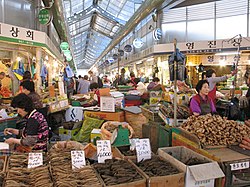Traditional Korean medicine

| Against allopathy Alternative medicine |
| Clinically unproven |
| Woo-meisters |
Traditional Korean Medicine (한의학) refers to the theories and practices of diagnosis and healing developed historically in Korea. TKM is partly based on traditional Chinese medicine.
Some of the TKM doctors believe in vaccine conspiracy theories.
Position of TKM in South Korea
In South Korea, there is not much opposition to TKM. In addition, the category of 'libel and slander' is so broad in Korea that extreme slandering of Chinese medicine may be subject to criminal punishment.
Although it is pseudoscientific, many Koreans visit TKM hospitals frequently for treatment acupuncture and moxibustion, which they believe relieves pain.
Politically, Minjoo or LKP supporters tend to defend TKM. On the other hand, the pro-Western RFP and its supporters abhor TKM. Indeed, a supporter of the RFP, a male YouTuber in his twenties who hated TKM, was accused of severe criticism of TKM and an arrest warrant was even announced.[1] In Korea, the legal profession also protects the "honor" of pseudomedics!
However, not all Minjoo or LKP supporters are favorable to TKM, and some among the RFP supporters are favorable to TKM. In the first place, South Korea's mainstream parties have no clear stance on TKM.
Aristolochia
Various species of the Aristolochia genus are used medicinally throughout the world. Aristolochia is highly toxic to humans when consumed because it contains aristolochic acid (AA). Aristolochia causes kidney failure (aristolochic acid nephropathy or AAN) and cancer. Korea is no exception, where Aristolochia contorta (쥐방울덩굴) and A. manshuriensis (등칡) are used in herbal medicine.[2][3] A study of AAN in South Korea found that AA is found in some Korean herbal remedies, that South Koreans have experienced AAN, and that there is a possibility that AAN is under-diagnosed in South Korea.[4]
See also
References
- ↑ 유튜버 '윾튜브', 한의사 비방하다 피소..경찰, 압색영장 검토
- ↑ [http://jdm0777.com/a-yakchotxt/jwibanguldeongkul.htm ≪ 쥐방울덩굴 무엇인가?
- ↑ 등칡 Ik Saeng.
- ↑ Update of aristolochic acid nephropathy in Korea by Tae Hyun Ban et al. (2018) Korean J. Intern. Med. 33(5):961–969.
You can help RationalWiki by expanding it.